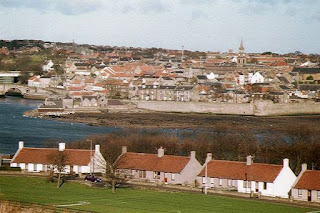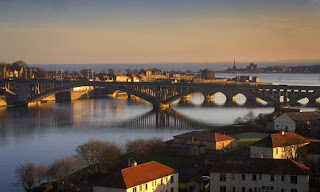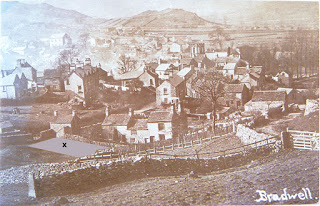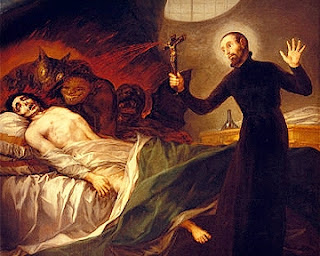Of the Green Children
Again, this is segment from the
History of English Affairs by William Newburgh. It tells of two children who
turn up in an East Anglian village with green skin and who can’t speak a word
of English. I have read an account of this occurrence in the venerable Fortean
Times and I’ve been given the idea that this has gone down into local folklore
and the facts of which have been modified into a local fairy tale.
Enjoy!
 |
| Woolpit, Suffolk |
 |
| Green Children of Woolpit, Suffolk |
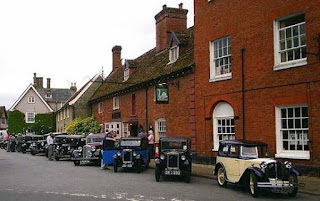 |
| Woolpit, Suffolk |
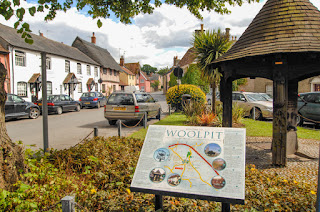 |
| Woolpit,,Suffolk |
Nor does it seem right to
pass over an unheard-of prodigy, which, as is well known, took place in England
during the reign of King Stephen. Though it is asserted by many, yet I have
long been in doubt concerning the matter, and deemed it ridiculous to give
credit to a circumstance supported on no rational foundation, or at least one
of a very mysterious character; yet, at length I was so overwhelmed by the
weight of so many and such competent witnesses, that I have been compelled to
believe, and wonder over a matter, which I was unable to comprehend, or
unravel, by any powers of intellect.
In East Anglia there is a
village, distant, as it is said, four or five miles from the noble monastery of
the blessed king and martyr, Edmund; near this place are seen some very ancient
cavities, called "Wolfpittes," that is, in English, "Pits for
wolves," and which give their name to the adjacent village. During
harvest, while the reapers were employed in gathering in the produce of the
fields, two children, a boy and a girl, completely green in their persons, and
clad in garments of a strange colour, and unknown materials, emerged from these
excavations. While wandering through the fields in astonishment, they were
seized by the reapers, and conducted to the village, and many persons coming to
see so novel a sight, they were kept some days without food. But, when they
were nearly exhausted with hunger, and yet could relish no species of support
which was offered to them, it happened, that some beans were brought in from
the field, which they immediately seized with avidity, and examined the stalk
for the pulse, but not finding it in the hollow of the stalk, they wept
bitterly. Upon this, one of the bystanders, taking the beans from the pods,
offered them to the children, who seized them directly, and ate them with
pleasure. By this food they were supported for many months, until they learnt
the use of bread.
At length, by degrees, they
changed their original colour, through the natural effect of our food, and
became like ourselves, and also learnt our language. It seemed fitting to
certain, discreet persons that they should receive the sacrament of baptism,
which was administered accordingly. The boy, who appeared to be the younger,
surviving his baptism but a little time, died prematurely; his sister, however,
continued in good health, and differed not in the least from the women of our
own country. Afterwards, as it is reported, she was married at Lynne, and was
living a few years since, at least, so they say.
Moreover, after they had
acquired our language, on being asked who and whence they were, they are said
to have replied, "We are inhabitants of the land of St. Martin, who is
regarded with peculiar veneration in the country which gave us birth."
Being further asked where that land was, and how they came thence hither, they
answered, "We are ignorant of both those circumstances; we only remember
this, that on a certain day, when we were feeding our father's flocks in the
fields, we heard a great sound, such as we are now accustomed to hear at St.
Edmund's, when the bells are chiming; and whilst listening to the sound in
admiration, we became on a sudden, as it were, entranced, and found ourselves
among you in the fields where you were reaping." Being questioned whether
in that land they believed in Christ, or whether the sun arose, they replied
that the country was Christian, and possessed churches; but said they,
"The sun does not rise upon our countrymen; our land is little cheered by
its beams; we are contented with that twilight, which, among you, precedes the
sun-rise, or follows the sunset. Moreover, a certain luminous country is seen,
not far distant from ours, and divided from it by a very considerable
river." These, and many other matters, too numerous to particularize, they
are said to have recounted to curious inquirers. Let everyone say as he
pleases, and reason on such matters according to his abilities; I feel no
regret at having recorded an event so prodigious and miraculous.
Appendix 1: On further research, I have found that there is a form of lead
poisoning that comes about when a person lives without proper access to
daylight. This can give a person grey
skin tinged with a little green. This is the nearest thing I have found to a
none supernatural explanation to this phenomena. As for the children not being
able to understand a word of English, it could be speculated that they could
have been Welsh or Cornish. The Celtic language would still have been common in
Wales or Cornwall in the 12th century. Could that have been the case
with these two youngsters? With small parties of Vikings making their way to
the Arabian court and to America during the previous four centuries, it could
be possible. Stranger things have happened.
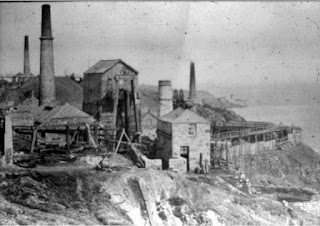 |
| Welsh tin mine |
Appendix 2: In regards to the two youngsters appearing out of the ground, there
could very well be a connection with this and the possibility that they were
from mining families – see above, in relation to the possible lead
poisoning/sunlight deprivation. Mines would have employed children in this
period. Living in or near mines and caverns may well have been the only thing
that they were used to. Thus, they would have sought shelter in similar places
on their possible journey east.

